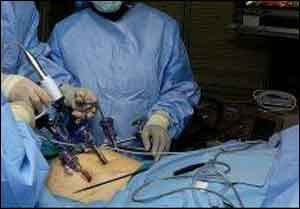- Home
- Editorial
- News
- Practice Guidelines
- Anesthesiology Guidelines
- Cancer Guidelines
- Cardiac Sciences Guidelines
- Critical Care Guidelines
- Dentistry Guidelines
- Dermatology Guidelines
- Diabetes and Endo Guidelines
- Diagnostics Guidelines
- ENT Guidelines
- Featured Practice Guidelines
- Gastroenterology Guidelines
- Geriatrics Guidelines
- Medicine Guidelines
- Nephrology Guidelines
- Neurosciences Guidelines
- Obs and Gynae Guidelines
- Ophthalmology Guidelines
- Orthopaedics Guidelines
- Paediatrics Guidelines
- Psychiatry Guidelines
- Pulmonology Guidelines
- Radiology Guidelines
- Surgery Guidelines
- Urology Guidelines
KGMU surgeons execute complicated cancer surgery by laparoscopic method

Doctors of surgical gastroenterology department of King George’s Medical University (KGMU) have accomplished a rare feat by performing Whipple surgery through the technically-challenging minimally invasive laparoscopic method. The patient is a 38-year-old woman a resident of Lucknow who was suffering from pancreatic cancer and reported to the hospital for treatment.
The patient had symptoms of jaundice for a long time not improving on treatment and it turned out to be a case of pancreatic cancer after investigations.
The Whipple procedure, or pancreaticoduodenectomy, is the most common surgery to remove tumours in the pancreas. Surgery to remove a tumour offers the best chance for long-term control of all pancreatic cancer types. The Whipple removes and reconstructs a large part of the gastrointestinal tract and is a difficult and complex operation. It is generally conducted as an open surgery where an incision of 20-25 cm is made on the abdomen to remove the head of the pancreas, duodenum (first part of the small intestine), gallbladder and bile duct.
“A big incision is made in open surgery. While the laparoscopic method involves precise manoeuvring and takes longer than an open procedure. Laparoscopy has less blood loss and faster post-operative recovery,” said the head of the department, Prof Abhijit Chandra to TOI.
Dr Saket said that the pancreatic surgery is often referred to as ‘tiger’s territory’ due to the complexities involved and laparoscopic removal of a pancreatic tumour is a major achievement. Dr Vivek Gupta said that the patient is doing fine after the surgery. The patient was discharged on Sunday after the recovery.

Disclaimer: This site is primarily intended for healthcare professionals. Any content/information on this website does not replace the advice of medical and/or health professionals and should not be construed as medical/diagnostic advice/endorsement or prescription. Use of this site is subject to our terms of use, privacy policy, advertisement policy. © 2020 Minerva Medical Treatment Pvt Ltd